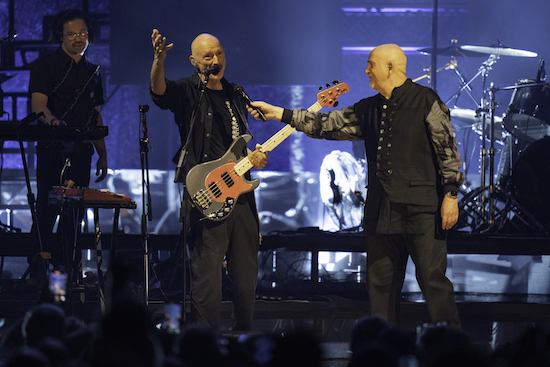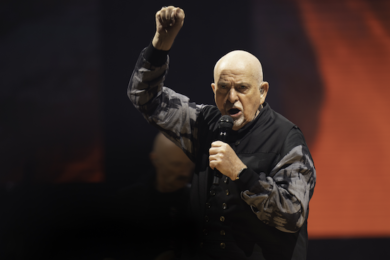When I first heard about Peter Gabriel’s gender reassignment procedure, I was disappointed. Not that I had an objection to the gender reassignment itself, that was his business. But I had been due to meet Gabriel himself at his London concert and now that longed-for date was going to be pushed back until after he transitioned.
It’s been a long time since the defining let-down of my adolescence, and I still haven’t met Peter Gabriel – who did not, in the end, transition. Now I am a middle-aged man, on the younger end of the demographic watching Peter Gabriel, on the cusp of old-age, performing at the O2 in London.
I have never wanted to be the kind of middle-aged man whose tastes froze in their twenties. So I was pleased to hear before the show that Gabriel was planning on playing a lot of new stuff from his first studio album in twenty years (which is not yet out; it is being drip-fed through a series of singles). In fact, I was kind of dreading the inevitable contrast between tepidly polite audience reaction to recent works and the whoops of joy that would greet So-era Gabriel.
While I was looking forward to the show, what I didn’t want to do was to love it. Or more accurately, I didn’t want to love him. Because I’d been there before. In my teens I loved Peter Gabriel. Something about his 1986 album So seemed to trigger a torrent of emotion in me that I have yet to completely recover from.
Adolescent male sexuality is an odd thing, or at least mine was. As it developed, my love affair with Peter Gabriel seemed to border on the sexual, despite my stubborn straightness. I adored his gorgeous face, his delightful voice, the way his body moved. I saturated myself with him; buying and playing to death every album he ever made. I listened repeatedly to even the ropiest 12-inch B-side.
At the same time, I totally missed the sexuality in Peter Gabriel’s songs. ‘Sledgehammer’ is a blatant, hilarious, anthem to sex, but I didn’t notice the barely-innuendos (‘open up your fruitcage’ etc.) during my teenage infatuation. I was in similar denial about ‘Sledgehammer’s equally blatant tribute to/rip off of soul. I’d always convince myself that I didn’t like soul. I hated men in smart suits, crooning overt eroticism. As a white man singing soul, Peter Gabriel was acceptable to me; his sex I could deny in a way that I couldn’t for a black man. My incipient racism was as buried within me as deeply as my own eroticism.
Despite this denial, Peter Gabriel helped me feel. When I saw him live at Earls Court in 1987, I experienced an overwhelming intensity of feeling, despite the tin-can arena sound. When the singer let himself fall backwards into the audience on ‘Lay Your Hands On Me’ it was as though I was one of the hands holding him up, even though I was stuck in the cheap seats at the back. In the afterglow of the show, I experienced a mounting sadness with every day that passed, as the event receded into history.
The world of 15-year-old boys – at least in the 1980s, at least in my elite public school – is a world of unspeakability. I had some close friendships but they didn’t include speaking of desires and insecurities. But I could speak about Peter Gabriel. Incessantly. To everyone.
Naturally I wanted to meet the great man himself. I had a plan. I wrote to him and asked if I could interview him for my school magazine. Peter Gabriel, scion of Charterhouse School, might well recognise me as a fellow entitled public schoolboy.

There are continuities between the 2023 Peter Gabriel and the 1980s model. The O2 show was a lavish affair, using cutting edge visual effects just as he did on the So tour. Many of the songs are illustrated with images and videos produced by visual artists (including Ai Wei Wei) to whom he carefully gives credit. Musically, his 2023 touring lineup benefits from his chemistry with longstanding band members Tony Levin, David Rhodes and Manu Katche, as well as with newer recruits, particularly the astonishing voice and cello of Ayanna Witter-Johnson. His between-song banter is the usual mixture of dry wit and idealistic preaching.
It’s an impeccable show, without any spontaneity at all. I don’t know if that’s a problem or not. What I do know is that I no longer have any desire to meet Peter Gabriel. By all accounts he seems a pleasant, engaging and interesting fellow. While he remains charismatic, he no longer exudes sex. And his longstanding techno-utopianism feels like an inadequate response to current conditions (there is a long speech where he extols the possibilities of AI). Still, as the guy sitting next to me pointed out, Gabriel in 2023 is a much more inviting prospect than Roger Waters in 2023.

A couple of weeks after I posted the letter to my hero, my form teacher handed me a single folded piece of paper. On the back someone from the school office had scrawled, ‘DO NOT USE THE SCHOOL AS YOUR MAILING ADDRESS!’. I unfolded the paper to find a word-processed letter, addressed from Real World Studios – Peter Gabriel’s studio! The singer’s PA thanked me for my letter and told me that I could visit him backstage at his next show at Earls Court in a few months time.
Well, what was there to say? Obviously I was thrilled; obviously I told everyone; obviously I impatiently counted down the months, weeks and days.
I was puzzled though, when the gig still hadn’t been announced with a couple of months to go. So I wrote again, politely, to confirm the arrangement. Again, I received a envelope-less letter a couple of weeks later, this time with an even more menacing message handwritten on the back: ‘LAST WARNING: DO NOT USE THE SCHOOL AS YOUR MAILING ADDRESS!’ Again, I found a letter inside from Peter Gabriel’s PA:
Dear Keith,
Peter Gabriel has decided to undergo a sex change operation so his Earls Court concert has been cancelled. However, you will be permitted to meet him backstage at his concert at Wembley Arena next year.
Yours sincerely,
Peter Gabriel’s PA
Well what is there to say? I wanted to believe it because I wanted to meet him backstage at Wembley Arena the following year. But it made no sense at all. I discussed the letter with my friend Guy, with whom I often shared my love for all things Gabriel. Neither of us had any idea what to make of the letter.
The next day, David, a guy in my year whom I wasn’t really friends with but knew a little bit, came up to me. I’ve blanked out what he said. You can probably guess what it was. What I do remember though is that he emphasised that Guy wasn’t involved. Yes he was very clear about that.

I was all restraint and scepticism at the O2 as befitting my role as 51-year-old writer. But then, a few songs in, he played ‘Four Kinds Of Horses’, one of his new tracks. Initially subtle and low-key like a lot of his recent work, the soaring chorus hit me like a hammer. It was an old feeling; joy, love and heart-burst.
As the show progressed (two sets and an interval) I was slightly amazed that my determination not to be a nostalgist wasn’t an act. The new stuff is compelling and frequently beautiful. What need did I have for 80s callbacks?
And then, half-way through the second set, ‘Don’t Give Up’ happened and I found myself weeping.
This is not my usual practice. It was all the more surprising given that it isn’t one of my favourite Gabriel tracks. This version was just perfection though. One of Gabriel’s most admirable qualities is his generosity to other musicians. Ayanna Witter-Johnson’s performance of the Kate Bush part was so exquisite and powerful that you could almost feel the arena taking their eyes off the star and realising that it takes a village to make an arena show. It was a transcendent moment.
It was a brave show. To stuff the set with songs that will be unfamiliar to much of the audience (some, in fact, have not been released yet) is a bold decision. When he followed ‘Red Rain’ with the unreleased ‘And Still’ he almost seemed to be trolling us. For me, the boldness paid off, although crowd reactions were fairly muted. Peter Gabriel is still experimenting, still eccentric, still mischievous.

Post-hoax I learned the hard lessons of the British public school: Do not enthuse, do not adore, do not reveal yourself, do not give anyone an inch; affect to be carefree, affect to be apathetic, affect to be immune to enthusiasm.
I never renounced Peter Gabriel entirely. In time though, I found new musical pleasures and new friends that shared them. I never loved again the way I loved Peter Gabriel though. I never idealised again.
Perhaps the hoax spared me from disappointment. His post-So releases have their moments but are massively over-egged. A pioneer in exploiting studio technology, Peter Gabriel seems to have been overwhelmed by the exponential growth in new recording techniques. His patiently meticulous song-writing appeared to have tipped over into procrastination and an inability to tell when a song is finished.
Peter Gabriel is and was a fallible human being. That extends to his personal life. In the 1980s, he left his wife for the actress Rosanna Arquette and his relationship with his daughter suffered. He can be naïve in his enthusiasms. At one stage he was a follower of the new age therapeutic movement est, whose cult-like practices drove one of my relatives close to a breakdown. Also, in his later years, he has started to wear smocks.
Peter Gabriel isn’t someone to idolise; nor is almost anyone else. That’s the point: idolisation is a very bad idea. Learning the fallible sides of an artist, the professional and personal missteps, helps to inoculate yourself against the possibility of infection with the virus that nearly broke me.
And maybe also this restraint can make musical pleasures all the sweeter. The discovery that Peter Gabriel’s newer music is better than anything he has done in decades was the best kind of surprise. That most of the new songs worked so well in concert was equally thrilling. That his current band also refreshes and renews the old songs is really the cherry on the top.
Peter Gabriel plays more UK/Irish dates this month and tours America later this year



